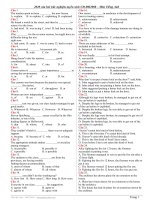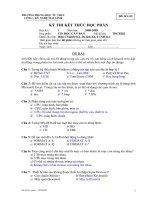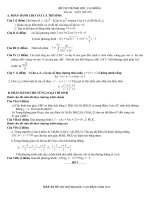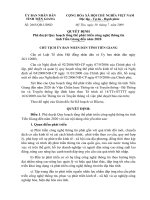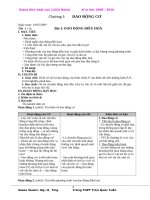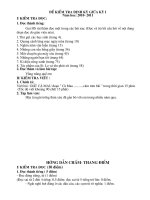OWNER 202
Bạn đang xem bản rút gọn của tài liệu. Xem và tải ngay bản đầy đủ của tài liệu tại đây (101.53 KB, 9 trang )
SƠ GD&ĐT VINH PHUC
TRƯƠNG THPT LIÊN SƠN
(Đề thi gồm: 05 trang)
ĐỀ KTCL ƠN THI THPT QUỐC GIA NĂM 20172018
Mơn: TIẾNG ANH – ĐÊ SỐ 202
Thời gian làm bài: 60 phút, không kể thời gian phát
đề
Ho va tên thi sinh:……………………………………………………………………. SBD:…………………………
Mark the letter A, B, C, or D on your answer sheet to indicate the word whose underlined part
differs from the other three in pronunciation in each of the following questions.
Question 01: A. doll
B. pole
C. post
D. toll
Question 02: A. mango
B. shank
C. angry
D. change
Mark the letter A, B, C, or D on your answer sheet to indicate the correct answer to each of the
following questions.
Question 03: The wheel, _______ has remained important for 4,000 years, is one of mankind's first
inventions.
A. how
B. when
C. about
D. which
Question 04: _______ there is a close correlation between stress and illness.
A. Some psychologists believe
B. Some psychologists believing
C. Some psychologists to believe
D. Believed some psychologists
Question 05: Perspiration increases_______ vigorous exercise or hot weather.
A. when
B. for
C. at the time
D. during
Question 06: Although dissimilar in almost every other respect, birds and insects have both
evolved efficient_______ capabilities.
A. flying
B. fly
C. to fly
D. is frying
Question 07: A home computer_______ an opportunity for convenient and efficient work at home.
A. provides
B. to be providing C. providing it
D. which provides
Question 08: Goddard developed the first rocket to fly faster_______.
A. than sound is
B. sound
C. does sound
D. than sound
Question 09: I forgot to_______ earlier that I'll be home late this evening.
A. relate
B. announce
C. narrate
D. mention
Question 10: Even if the unemployment rate_______ sharply, the drop may still be temporary.
A. have dropped
B. to drop
C. dropping
D. drops
Question 11: Some of the rainwater from clouds evaporates before_______ .
A. reaching the ground B. to reach the ground C. the ground reaches D. reach the ground
Question 12: Sometimes sleep itself wears people out and is worse than the lack of_______ .
A. the desire to sleep who B. to desire sleep is C. the desire to sleep D. to sleep the desire
Question 13: _______ children master the basics, advanced development becomes easier.
A. Once
B. The
C. Even
D. That
Question 14: "Let's go! What's taking you so long?" ~ "I'll be there as soon as I_______ my keys."
A. find
B. found
C. am finding
D. will find
Question 15: You look tired. Why don't we_______ and have a good rest?
A. call its name
B. call on
C. call off
D. call it a day
Question 16. Jane really loves the_______ jewelry box that her parents gave her as a birthday
present.
A. nice brown wooden B. brown wooden nice C. nice wooden brown D. wooden brown nice
Question 17. The local authorities are conducting_________ campaign to help_________ disabled.
A. a/ the
B. the/
C. /
D. / the
Mark the letter A, B, C, or D on your answer sheet to indicate the sentence that best completes
each of the following exchanges.
Question 18: ~ Barrack: “What’s your favorite cosmetic item?” ~ Emma: “______________ ”
A. Channel perfume and Louboutin shoes
B. A diamond ring and a platinum
bracelet.
C. A cherry red lipstick.
D. A Chambers’ hat and Drake’s tie
Question 19: ~ Linda: “What style do you choose to wear?” ~ Marx: “______________ ”
A. That’s to my taste.
B. I prefer Lady Gaga’s.
C. I choose a formal or informal dress.
D. Black silk.
Read the following passage and mark the letter A, B, C, or D on your answer sheet to indicate
the correct answer to each of the questions.
BRINGING UP CHILDREN
Where one stage of child development has been left out, or not sufficiently experienced, the
child may have to go back and capture the experience of it. A good home makes this possible - for
example, by providing the opportunity for the child to play with a clockwork car or toy railway
train up to any age if he still needs to do so. This principle, in fact, underlies all psychological
treatment of children in difficulties with their development, and is the basic of work in child
clinics.
The beginnings of discipline are in the nursery. Even the youngest baby is taught by
gradual stages to wait for food, to sleep and wake at regular intervals and so on. If the child feels
the world around him is a warm and friendly one, he slowly accepts its rhythm and accustoms
himself to conforming to its demands. Learning to wait for things, particularly for food, is a very
important element in upbringing, and is achieved successfully only if too great demands are not
made before the child can understand them. Every parent watches eagerly the child's acquisition
of each new skill: the first spoken words, the first independent steps, or the beginning of reading
and writing. It is often tempting to hurry the child beyond his natural learning rate, but this can
set up dangerous feelings of failure and states of anxiety in the child. This might happen at any
stage. A baby might be forced to use a toilet too early, a young child might be encouraged to learn
to read before he knows the meaning of the words he reads. On the other hand, though, if a child is
left alone too much, or without any learning opportunities, he loses his natural zest for life and his
desire to find out new things for himself. Learning together is a fruitful source of relationship
between children and parents. By playing together, parents learn more about their children and
children learn more from their parents. Toys and games which both parents and children can
share are an important means of achieving this co-operation. Building-block toys, jigsaw puzzles
and crosswords are good examples.
Parents vary greatly in their degree of strictness or indulgence towards their children.
Some may be especially strict in money matters; others are severe over times of coming home at
night, punctuality for meals or personal cleanliness. In general, the controls imposed represent
the needs of the parents and the values of the community as much as the child's own happiness
and well-being.
With regard to the development of moral standards in the growing child, consistency is
very important in parental teaching. To forbid a thing one day and excuse it the next is no
foundation for morality. Also, parents should realize that "example is better than precept". If they
are hypocritical and do not practise what they preach, their children may grow confused and
emotionally insecure when they grow old enough to think for themselves, and realize they have
been, to some extent, deceived. A sudden awareness of a marked difference between their parents'
ethics and their morals can be a dangerous disillusion.
Question 20: The practice of the rule "Example is better than precept"________.
A. only works when the children grow old enough to think for themselves
B. will free a child from disillusion when he grows up
C. is too difficult for all parents to exercise
D. would help avoid the necessity for ethics and morals
Question 21: The word ‘imposed’ in the 3rd paragraph is closest in meaning to________.
A. introduced
B. made
C. excepted
D. constrained
Question 22: The word ‘zest’ in the 2nd paragraph can be best replaced by________.
A. enthusiasm
B. enjoyment
C. excitement
D. appetite
Question 23: The phrase ‘conforming to’ in the 2nd paragraph means________.
A. agreeing with
B. following
C. adapting to
D. accepting
Question 24: The principle underlying all treatment of developmental difficulties in children________.
A. is to capture them before they are sufficiently experienced B. is to send them to clinics
C. is in the provision of clockwork toys and trains D. offers recapture of earlier experiences
Question 25: The encouragement of children to achieve new skills________.
A. can never be taken too far
B. should be balanced and moderate
C. should be focused on only at school
D. will always assist their development
Mark the letter A, B, C, or D on your answer sheet to indicate the word(s) OPPOSITE in
meaning to the underlined word(s) in each of the following questions.
Question 26: We paid through the nose to get the car fixed and it still doesn't go properly.
A. spent too much B. charge highC. pay too much money for D. haggle
Question 27: The seven cities of Troy excavated gave new meaning to the remains of ancient
peoples. A. burned down B. dug up
C. concealed
D. buried
Choose the best option A, B, C or D to complete the passage. Mark your choice on the answer
sheet.
No educational medium better serves as a means of spatial communication than the atlas.
Atlases deal with such invaluable information as population distribution and density. One of the
best, Pennycooke's World Atlas, has been widely accepted as a standard owing to the quality of its
maps and photographs, which not only show various settlements but also portray them in a
variety of scales. In fact, the very first map in the atlas is a cleverly designed population cartogram
that projects the size of each country if geographical size were proportional to population.
Following the proportional layout, a sequence of smaller maps shows the world's population
density, each country's birth and death rates, population increase or decrease, industrialization,
urbanization, gross national product in term of per capita income, the quality of medical care,
literacy, and language. To give readers a perspective on how their own country fits in with the
global view, additional projections depict the world's patterns in nutrition, calorie and protein
consumption, health care, number of physicians per unit of population, and life expectancy by
region. Population density maps on a subcontinental scale, as well as political maps, convey the
diverse demographic phenomena of the world in a broad array of scales.
Question 28: What is the main topic of this passage?
A. The educational benefits of atlases
B. Physical maps in an atlas
C. The ideal in the making of atlases
D. Partial maps and their uses
Question 29: The word cleverly in the passage is closest in meaning to____.
A. clearly
B. immaculately
C. intelligently
D. accurately
Question 30: The word layout in the passage refers to_________.
A. the cartogram
B. the geographical size
C. population
D. each country
Question 31: The phrase in term of used in the passage is closest in meaning to_________.
A. for considering aspects B. in spite of
C. with a view to
D. in regard to
Question 32: It can be inferred from the passage that maps can be used to_________.
A. pinpoint ethnic strife in each country
B. identify a shortage of qualified labour
C. give readers a new perspective in their own country
D. show readers photographs in a new form
Question 33: The word convey in the passage is closest meaning to_________.
A. devise
B. conjure up
C. demonstrate
D. indicate
Choose the underlined word or phrase in each sentence that needs correcting. Mark your
choice on the answer sheet.
Question 34: Not until I was on my way to the airport that I realized I had left my passport at
home.
A. until
B. on my way
C. that I realized
D. at home
Question 35: Marry charity organizations have brought food supplies and clothes to floodeffecting areas in the Mekong Delta.
A. flood-effecting
B. have brought
C. the
D. charity
Question 36: Dinosaurs became extinct millions of years ago because of the earth's climate
changed drastically.
A. because of
B. the earth's
C. drastically
D. became extinct
Mark the letter A, B, C, or D on your answer sheet to indicate the sentence that is closest in
meaning to each of the following questions.
Question 37: It was a mistake for her to marry Peter.
A. She and Peter weren’t married in the right way.
B. Peter didn’t want to get married, so it was his mistake.
C. She shouldn’t have married Peter.
D. She ought to think again before she marries Peter.
Question 38: I tried hard, but I couldn’t reach him.
A. No matter how hard I tried, I couldn’t reach him. B. Though trying hard, I could reach
him.
C. Hard as I tried, I couldn’t meet him.
D. Despite trying hard, he was unable to reach.
Question 39: I ran into Peter, a friend of mine, on my may to work this morning.
A. Peter ran into his friend this morning.
B. Peter and I ran to work this morning
C. Peter had to work this morning, but I did not
D. I met Peter unexpectedly on my way to work this morning.
Mark the letter A, B, C, or D on your answer sheet to indicate the sentence that best combines
each pair of sentences in the following questions.
Question 40: I had to hand the project over to Max. You didn’t respond to any of my e-mails.
A. When I had to hand the project over to Max, you didn’t respond to any of my e-mails.
B. I had to hand the project over to Max, because you didn’t respond to any of my e-mails.
C. Although I had to hand the project over to Max, you didn’t respond to any of my e-mails.
D. If I had had to hand the project over to Max, you would have responded to any of my emails.
Question 41: Enrollment in the university has been dropping in recent years. Its facilities have been
lacking proper maintenance.
A. If enrollment in the university had not been dropping in recent years, its facilities would
have been lacking proper maintenance.
B. Even though enrollment in the university has been dropping in recent years, its facilities
have been lacking proper maintenance.
C. Enrollment in the university has been dropping in recent years, and its facilities have
been lacking proper maintenance.
D. Enrollment in the university has been dropping in recent years, because its facilities
have been lacking proper maintenance.
Mark the letter A, B, C, or D on your answer sheet to indicate the word(s) CLOSEST in meaning
to the underlined word(s) in each of the following questions.
Question 42: Anna laid a wet blanket as we suggested spending our holidays in the mountains.
A. bought clothes
B. denounced the idea
C. prepared things for the trip
D. resisted joining
Question 43: As soon as they met they started to rub each other up the wrong way.
A. annoyed without intending to
B. shook hands excitedly
C. told about old things
D. fought one another
Read the following passage and mark the letter A, B, C, or D on your answer sheet to indicate
the correct word or phrase that best fits each of the numbered blanks.
ALTERNATIVE ENERGIES
Imagine life without electricity! What effect would that have on the typical British family?
Well, there would be no hot water for showers in the morning or, more importantly, the (44)_______
cup of tea! Most families use kettles for this - electric water boilers that sit in every British kitchen.
Then, of course, you wouldn’t be able to charge your phone, tablet or laptop. Now that’s serious!
And when you left the house, (45)_______ wouldn’t be any traffic lights, cash machines or
supermarkets. You might think that is just a horror story, but the lights might go out sooner than
we think if we don’t act soon and move to renewable energy. These are forms of energy which
protect the environment as they do not produce carbon dioxide emissions that (46)_______ to
climate change. They are often cheaper because the energy is generated from 100 percent natural
resources - so they can never run out like coal!
So what forms of renewable energy are there? Electricitycan also be provided by the wind
(wind power), the sun (solar power), the sea (tidal/wave power) and even by volcanoes
(geothermal power). The type of energy a country uses depends a lot on geography. Sunny Spain
has more solar power than the UK and volcanic Iceland has much more geothermal power.
In the UK, wind power is one of the most popular forms of renewable energy. It used to
represent only a fraction of the country’s energy supply but now it provides a mighty eleven
percent. In fact, Britain currently (47)_______ at number six in the world’s wind power producers,
with over 7,000 onshore wind turbines. And now there are almost 5,000 turbines offshore as well
(that's in the middle of the sea!), making it the world leader. Why not visit the largest offshore
wind farm in the world at the (48)_______ of the River Thames?
[Source: Wider World 3,
Pearson, 2015]
Question 44: A. Optional
B. festival
C. traditional
D. national
Question 45: A. there
B. they
C. you
D. it
Question 46: A. lead
B. cause
C. expose
D. gain
Question 47: A. rises
B. grows
C. ranks
D. stands
Question 48: A. mouth
B. bottom
C. bank
D. centre
Mark the letter A, B, C, or D on your answer sheet to indicate the word that differs from the
other three in the position of primary stress in each of the following questions.
Question 49: A. substitute
B. refusal
C. phenomenon
D. magnetic
Question 50: A. machine
B. majesty
C. manure
D. magnificent
______THE END______
SƠ GD&ĐT VINH PHUC
TRƯƠNG THPT LIÊN SƠN
(Đề thi gồm: 05 trang)
ĐỀ KTCL ÔN THI THPT QUỐC GIA NĂM 20172018
Môn: TIẾNG ANH – ĐÊ SỐ 202
Thời gian làm bài: 60 phút, không kể thời gian phát
đề
Ho va tên thi sinh:……………………………………………………………………. SBD:…………………………
Mark the letter A, B, C, or D on your answer sheet to indicate the word whose underlined part
differs from the other three in pronunciation in each of the following questions.
Question 01: A. doll
B. pole
C. post
D. toll
Question 02: A. mango
B. shank
C. angry
D. change
Mark the letter A, B, C, or D on your answer sheet to indicate the correct answer to each of the
following questions.
Question 03: The wheel, _______ has remained important for 4,000 years, is one of mankind's first
inventions.
A. how
B. when
C. about
D. which
Question 04: _______ there is a close correlation between stress and illness.
A. Some psychologists believe
B. Some psychologists believing
C. Some psychologists to believe
D. Believed some psychologists
Question 05: Perspiration increases_______ vigorous exercise or hot weather.
A. when
B. for
C. at the time
D. during
Question 06: Although dissimilar in almost every other respect, birds and insects have both
evolved efficient_______ capabilities.
A. flying
B. fly
C. to fly
D. is frying
Question 07: A home computer_______ an opportunity for convenient and efficient work at home.
A. provides
B. to be providing C. providing it
D. which provides
Question 08: Goddard developed the first rocket to fly faster_______.
A. than sound is
B. sound
C. does sound
D. than sound
Question 09: I forgot to_______ earlier that I'll be home late this evening.
A. relate
B. announce
C. narrate
D. mention
Question 10: Even if the unemployment rate_______ sharply, the drop may still be temporary.
A. have dropped
B. to drop
C. dropping
D. drops
Question 11: Some of the rainwater from clouds evaporates before_______ .
A. reaching the ground B. to reach the ground C. the ground reaches D. reach the ground
Question 12: Sometimes sleep itself wears people out and is worse than the lack of_______ .
A. the desire to sleep who B. to desire sleep is C. the desire to sleep D. to sleep the desire
Question 13: _______ children master the basics, advanced development becomes easier.
A. Once
B. The
C. Even
D. That
Question 14: "Let's go! What's taking you so long?" ~ "I'll be there as soon as I_______ my keys."
A. find
B. found
C. am finding
D. will find
Question 15: You look tired. Why don't we_______ and have a good rest?
A. call its name
B. call on
C. call off
D. call it a day
Question 16. Jane really loves the_______ jewelry box that her parents gave her as a birthday
present.
A. nice brown wooden B. brown wooden nice C. nice wooden brown D. wooden brown nice
Question 17. The local authorities are conducting_________ campaign to help_________ disabled.
A. a/ the
B. the/
C. /
D. / the
Mark the letter A, B, C, or D on your answer sheet to indicate the sentence that best completes
each of the following exchanges.
Question 18: ~ Barrack: “What’s your favorite cosmetic item?” ~ Emma: “______________ ”
A. Channel perfume and Louboutin shoes
B. A diamond ring and a platinum
bracelet.
C. A cherry red lipstick.
D. A Chambers’ hat and Drake’s tie
Question 19: ~ Linda: “What style do you choose to wear?” ~ Marx: “______________ ”
A. That’s to my taste.
B. I prefer Lady Gaga’s.
C. I choose a formal or informal dress.
D. Black silk.
Read the following passage and mark the letter A, B, C, or D on your answer sheet to indicate
the correct answer to each of the questions.
BRINGING UP CHILDREN
Where one stage of child development has been left out, or not sufficiently experienced, the
child may have to go back and capture the experience of it. A good home makes this possible - for
example, by providing the opportunity for the child to play with a clockwork car or toy railway
train up to any age if he still needs to do so. This principle, in fact, underlies all psychological
treatment of children in difficulties with their development, and is the basic of work in child
clinics.
The beginnings of discipline are in the nursery. Even the youngest baby is taught by
gradual stages to wait for food, to sleep and wake at regular intervals and so on. If the child feels
the world around him is a warm and friendly one, he slowly accepts its rhythm and accustoms
himself to conforming to its demands. Learning to wait for things, particularly for food, is a very
important element in upbringing, and is achieved successfully only if too great demands are not
made before the child can understand them. Every parent watches eagerly the child's acquisition
of each new skill: the first spoken words, the first independent steps, or the beginning of reading
and writing. It is often tempting to hurry the child beyond his natural learning rate, but this can
set up dangerous feelings of failure and states of anxiety in the child. This might happen at any
stage. A baby might be forced to use a toilet too early, a young child might be encouraged to learn
to read before he knows the meaning of the words he reads. On the other hand, though, if a child is
left alone too much, or without any learning opportunities, he loses his natural zest for life and his
desire to find out new things for himself. Learning together is a fruitful source of relationship
between children and parents. By playing together, parents learn more about their children and
children learn more from their parents. Toys and games which both parents and children can
share are an important means of achieving this co-operation. Building-block toys, jigsaw puzzles
and crosswords are good examples.
Parents vary greatly in their degree of strictness or indulgence towards their children.
Some may be especially strict in money matters; others are severe over times of coming home at
night, punctuality for meals or personal cleanliness. In general, the controls imposed represent
the needs of the parents and the values of the community as much as the child's own happiness
and well-being.
With regard to the development of moral standards in the growing child, consistency is
very important in parental teaching. To forbid a thing one day and excuse it the next is no
foundation for morality. Also, parents should realize that "example is better than precept". If they
are hypocritical and do not practise what they preach, their children may grow confused and
emotionally insecure when they grow old enough to think for themselves, and realize they have
been, to some extent, deceived. A sudden awareness of a marked difference between their parents'
ethics and their morals can be a dangerous disillusion.
Question 20: The practice of the rule "Example is better than precept"________.
A. only works when the children grow old enough to think for themselves
B. will free a child from disillusion when he grows up
C. is too difficult for all parents to exercise
D. would help avoid the necessity for ethics and morals
Question 21: The word ‘imposed’ in the 3rd paragraph is closest in meaning to________.
A. introduced
B. made
C. excepted
D. constrained
nd
Question 22: The word ‘zest’ in the 2 paragraph can be best replaced by________.
A. enthusiasm
B. enjoyment
C. excitement
D. appetite
Question 23: The phrase ‘conforming to’ in the 2nd paragraph means________.
A. agreeing with
B. following
C. adapting to
D. accepting
Question 24: The principle underlying all treatment of developmental difficulties in children________.
A. is to capture them before they are sufficiently experienced B. is to send them to clinics
C. is in the provision of clockwork toys and trains D. offers recapture of earlier experiences
Question 25: The encouragement of children to achieve new skills________.
A. can never be taken too far
B. should be balanced and moderate
C. should be focused on only at school
D. will always assist their development
Mark the letter A, B, C, or D on your answer sheet to indicate the word(s) OPPOSITE in
meaning to the underlined word(s) in each of the following questions.
Question 26: We paid through the nose to get the car fixed and it still doesn't go properly.
A. spent too much B. charge highC. pay too much money for D. haggle
Question 27: The seven cities of Troy excavated gave new meaning to the remains of ancient
peoples. A. burned down B. dug up
C. concealed
D. buried
Choose the best option A, B, C or D to complete the passage. Mark your choice on the answer
sheet.
No educational medium better serves as a means of spatial communication than the atlas.
Atlases deal with such invaluable information as population distribution and density. One of the
best, Pennycooke's World Atlas, has been widely accepted as a standard owing to the quality of its
maps and photographs, which not only show various settlements but also portray them in a
variety of scales. In fact, the very first map in the atlas is a cleverly designed population cartogram
that projects the size of each country if geographical size were proportional to population.
Following the proportional layout, a sequence of smaller maps shows the world's population
density, each country's birth and death rates, population increase or decrease, industrialization,
urbanization, gross national product in term of per capita income, the quality of medical care,
literacy, and language. To give readers a perspective on how their own country fits in with the
global view, additional projections depict the world's patterns in nutrition, calorie and protein
consumption, health care, number of physicians per unit of population, and life expectancy by
region. Population density maps on a subcontinental scale, as well as political maps, convey the
diverse demographic phenomena of the world in a broad array of scales.
Question 28: What is the main topic of this passage?
A. The educational benefits of atlases
B. Physical maps in an atlas
C. The ideal in the making of atlases
D. Partial maps and their uses
Question 29: The word cleverly in the passage is closest in meaning to____.
A. clearly
B. immaculately
C. intelligently
D. accurately
Question 30: The word layout in the passage refers to_________.
A. the cartogram
B. the geographical size
C. population
D. each country
Question 31: The phrase in term of used in the passage is closest in meaning to_________.
A. for considering aspects B. in spite of
C. with a view to
D. in regard to
Question 32: It can be inferred from the passage that maps can be used to_________.
A. pinpoint ethnic strife in each country
B. identify a shortage of qualified labour
C. give readers a new perspective in their own country
D. show readers photographs in a new form
Question 33: The word convey in the passage is closest meaning to_________.
A. devise
B. conjure up
C. demonstrate
D. indicate
Choose the underlined word or phrase in each sentence that needs correcting. Mark your
choice on the answer sheet.
Question 34: Not until I was on my way to the airport that I realized I had left my passport at
home.
A. until
B. on my way
C. that I realized
D. at home
Question 35: Marry charity organizations have brought food supplies and clothes to floodeffecting areas in the Mekong Delta.
A. flood-effecting
B. have brought
C. the
D. charity
Question 36: Dinosaurs became extinct millions of years ago because of the earth's climate
changed drastically.
A. because of
B. the earth's
C. drastically
D. became extinct
Mark the letter A, B, C, or D on your answer sheet to indicate the sentence that is closest in
meaning to each of the following questions.
Question 37: It was a mistake for her to marry Peter.
A. She and Peter weren’t married in the right way.
B. Peter didn’t want to get married, so it was his mistake.
C. She shouldn’t have married Peter.
D. She ought to think again before she marries Peter.
Question 38: I tried hard, but I couldn’t reach him.
A. No matter how hard I tried, I couldn’t reach him. B. Though trying hard, I could reach
him.
C. Hard as I tried, I couldn’t meet him.
D. Despite trying hard, he was unable to reach.
Question 39: I ran into Peter, a friend of mine, on my may to work this morning.
A. Peter ran into his friend this morning.
B. Peter and I ran to work this morning
C. Peter had to work this morning, but I did not
D. I met Peter unexpectedly on my way to work this morning.
Mark the letter A, B, C, or D on your answer sheet to indicate the sentence that best combines
each pair of sentences in the following questions.
Question 40: I had to hand the project over to Max. You didn’t respond to any of my e-mails.
A. When I had to hand the project over to Max, you didn’t respond to any of my e-mails.
B. I had to hand the project over to Max, because you didn’t respond to any of my e-mails.
C. Although I had to hand the project over to Max, you didn’t respond to any of my e-mails.
D. If I had had to hand the project over to Max, you would have responded to any of my emails.
Question 41: Enrollment in the university has been dropping in recent years. Its facilities have been
lacking proper maintenance.
A. If enrollment in the university had not been dropping in recent years, its facilities would
have been lacking proper maintenance.
B. Even though enrollment in the university has been dropping in recent years, its facilities
have been lacking proper maintenance.
C. Enrollment in the university has been dropping in recent years, and its facilities have
been lacking proper maintenance.
D. Enrollment in the university has been dropping in recent years, because its facilities
have been lacking proper maintenance.
Mark the letter A, B, C, or D on your answer sheet to indicate the word(s) CLOSEST in meaning
to the underlined word(s) in each of the following questions.
Question 42: Anna laid a wet blanket as we suggested spending our holidays in the mountains.
A. bought clothes
B. denounced the idea
C. prepared things for the trip
D. resisted joining
Question 43: As soon as they met they started to rub each other up the wrong way.
A. annoyed without intending to
B. shook hands excitedly
C. told about old things
D. fought one another
Read the following passage and mark the letter A, B, C, or D on your answer sheet to indicate
the correct word or phrase that best fits each of the numbered blanks.
ALTERNATIVE ENERGIES
Imagine life without electricity! What effect would that have on the typical British family?
Well, there would be no hot water for showers in the morning or, more importantly, the (44)_______
cup of tea! Most families use kettles for this - electric water boilers that sit in every British kitchen.
Then, of course, you wouldn’t be able to charge your phone, tablet or laptop. Now that’s serious!
And when you left the house, (45)_______ wouldn’t be any traffic lights, cash machines or
supermarkets. You might think that is just a horror story, but the lights might go out sooner than
we think if we don’t act soon and move to renewable energy. These are forms of energy which
protect the environment as they do not produce carbon dioxide emissions that (46)_______ to
climate change. They are often cheaper because the energy is generated from 100 percent natural
resources - so they can never run out like coal!
So what forms of renewable energy are there? Electricitycan also be provided by the wind
(wind power), the sun (solar power), the sea (tidal/wave power) and even by volcanoes
(geothermal power). The type of energy a country uses depends a lot on geography. Sunny Spain
has more solar power than the UK and volcanic Iceland has much more geothermal power.
In the UK, wind power is one of the most popular forms of renewable energy. It used to
represent only a fraction of the country’s energy supply but now it provides a mighty eleven
percent. In fact, Britain currently (47)_______ at number six in the world’s wind power producers,
with over 7,000 onshore wind turbines. And now there are almost 5,000 turbines offshore as well
(that's in the middle of the sea!), making it the world leader. Why not visit the largest offshore
wind farm in the world at the (48)_______ of the River Thames?
[Source: Wider World 3,
Pearson, 2015]
Question 44: A. Optional
B. festival
C. traditional
D. national
Question 45: A. there
B. they
C. you
D. it
Question 46: A. lead
B. cause
C. expose
D. gain
Question 47: A. rises
B. grows
C. ranks
D. stands
Question 48: A. mouth
B. bottom
C. bank
D. centre
Mark the letter A, B, C, or D on your answer sheet to indicate the word that differs from the
other three in the position of primary stress in each of the following questions.
Question 49: A. substitute
B. refusal
C. phenomenon
D. magnetic
Question 50: A. machine
B. majesty
C. manure
D. magnificent
______THE END______

